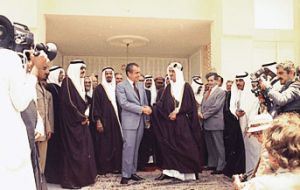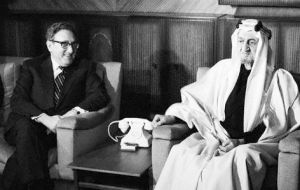MercoPress. South Atlantic News Agency
The evolution of the oil weapon
 After the 1973 embargo, Nixon approached Saudi Arabia with a proposed deal to ensure that a repeat of such an embargo would never happen to the US
After the 1973 embargo, Nixon approached Saudi Arabia with a proposed deal to ensure that a repeat of such an embargo would never happen to the US  Following some revisions, in 1976, the House of Saud and Henry Kissinger finally reached an agreement.
Following some revisions, in 1976, the House of Saud and Henry Kissinger finally reached an agreement. In the age of derivatives, swaps, and electronic money transfers, a new form of warfare has emerged: financial warfare. Recently, the US has passed sanctions on countries such as Syria, Venezuela and North Korea, but the majority of energy related sanctions passed have been targeted at Iran and Russia.
An estimated 68% of Russia's government revenue is derived from oil and gas exports, while 80% of Iran's revenue comes from oil exports. That presents a very large target for the use of financial weapons. To understand why financial warfare is now so commonplace, one must understand how it came into existence and what has been achieved taking such an approach.
The oil weapon first came into existence in 1965, when Egypt nationalized the Suez Canal. What resulted from this was a declaration of war by France, England, and Israel. As a way to counter this invasion, Saudi Arabia decided to ban exports to England and France. This embargo turned out to have minimal economic impact, as the US increased shipments to Europe, and international oil companies redirected shipments to England and France.
The next embargo imposed was in 1967, when Arab states imposed an embargo on the US, Britain, and West Germany. This embargo was enacted after a rumor surfaced that Britain and the US were providing air cover for Israeli planes, after Israel bombed Egyptian military airports in the 1967 war. This embargo failed, due to the fact that Arab oil revenues declined. This embargo also wasn't enforced properly, as Western countries were still receiving oil from Arab countries.
But the most famous incident came in 1973. This was when OPEC issued a new embargo on countries that provided military aid to Israel, in the Yom Kippur war. This proved to have a greater economic impact on Europe and the US, because Saudi Arabia displaced Texas as the world's swing producer.
The 1973 embargo led to an increase in domestic fuel prices, shortages of gasoline, and the rationing of gasoline fuel. This embargo changed the dynamics of US foreign policy. After the 1973 embargo, Richard Nixon sent his secretary of state Henry Kissinger to Saudi Arabia with a proposed deal, to ensure that an embargo such as this would never happen to the United States again.
After some revisions, in 1976, the House of Saud and Henry Kissinger finally reached an agreement. The agreement did the following things, according to Marin Katusa's 2014 book, “The Colder War.” The Saudi's agreed to:
1. Give the US as much oil as it desired, for general consumption and national security measures. Thus increasing or decreasing oil production to the benefit of the US
2. To only sell oil for US dollars, and to reinvest profits in US treasury securities.
In return, the US guaranteed:
1. The protection of the Saudi Kingdom from rival Arab countries
2. The protection of Saudi oil fields
3. Protection from an Israel invasion.
The Saudi's agreed to this because, even though they had vast amounts of oil, they didn't possess an army which could protect them from its surrounding enemies; which included Iran, Iraq, and Israel.
This deal not only secured a steady supply of oil to the US, but allowed the US to expand its global footprint.
How the US and the Saudi's colluded to topple the USSR
In 1982, a secret declaration for economic war with The Soviet Union was signed. This declaration included:
• No new contracts to buy Soviet natural gas
• Accelerate development of an alternate supply to Soviet gas for parts of Europe
• A plan to substantially raise interest rates on credit to the USSR
• The requirement of higher down payments and shorter maturities on Russian bonds.
This declaration made the USSR's debt load much more burdensome, but what delivered the final blow to the USSR was the doubling of oil production from Saudi Arabia in 1986. This pushed oil prices down to roughly 10 dollars per barrel, thus vastly decreasing the USSR's government revenue. This declaration combined with low oil prices, according to James Norman, author of the 2008 book, “The Oil Card,” is what led to the collapse of the USSR.
Today, the international financial system is much more sophisticated. Still, using financial sanctions with the intention of creating a de facto embargo on oil is a widespread practice today – just look at the cases of Iran and Russia.
By John Manfreda of Oilprice.com




Top Comments
Disclaimer & comment rules-

-

-

Read all commentsDesperately trying not to sound like Conq...
Jun 05th, 2015 - 12:12 pm 0However ANYTHING that hurts Russia is fantastic.
That it hurts Iran to is just an added bonus.
@1. Not necessarily. One must consider that Russia has a population around 144 million. The problem is a demagogue like Putin. Back in the 1940s, Russia was able to mobilise massive numbers of 'troops'. Therefore damage to Russia must be balanced. The basic mindset of Russian people is suspicion. Suspicion that “foreigners” are trying to cripple or destroy Russia. It matters not that Russia brings its problems on itself with the actions of such as Putin. It's a matter of effects, not causes.
Jun 05th, 2015 - 03:24 pm 0Damage to Iran is much more important. What intelligent people would hand over 'government' to bigoted, hatred-inspired, warmongering nutjobs? Looking back into history, it's what led to the separation of Church and State in Britain. Religion is all very well for those that need it and in times of great danger. When there's nothing else left. But for everyday life? One simple example. How much time is wasted praying five times a day? That's on top of meal breaks.
The truth is that Iran must be STOPPED first. I place no trust in the 'negotiations'. Especially with the apparent refusal to permit inspections and interviews with 'scientists'. Saddam Hussein got away with a lot. Witness the combat aircraft flown elsewhere (Iran). The chemical weapons hidden underground. The chemical weapons factory that IS now has under its control. How come IS doesn't attack Iran? I suggest that IS is actually an Iranian construct. Anyone noticed any criticism of IS from Iran?
Nope.
Jun 05th, 2015 - 08:06 pm 0Commenting for this story is now closed.
If you have a Facebook account, become a fan and comment on our Facebook Page!